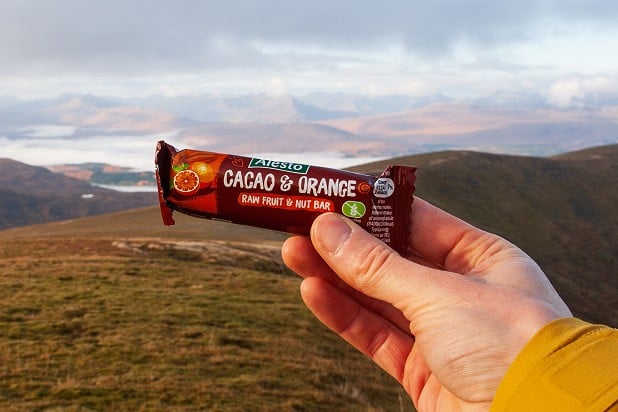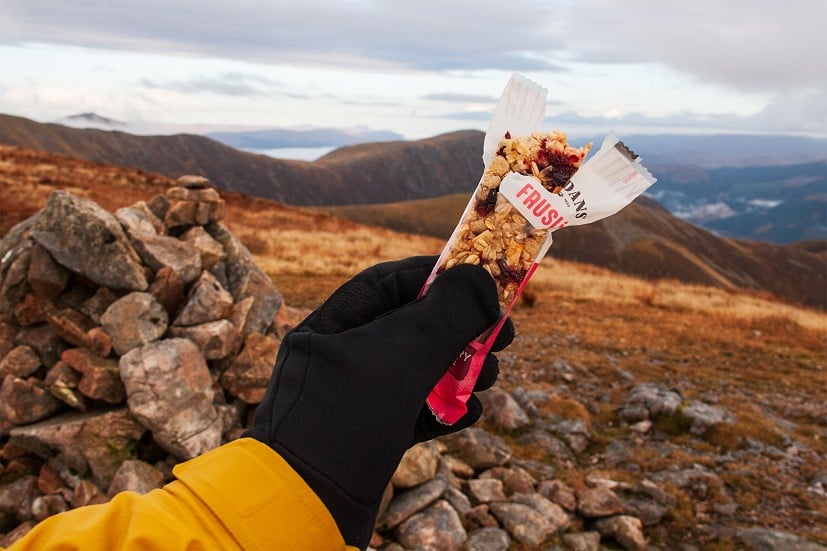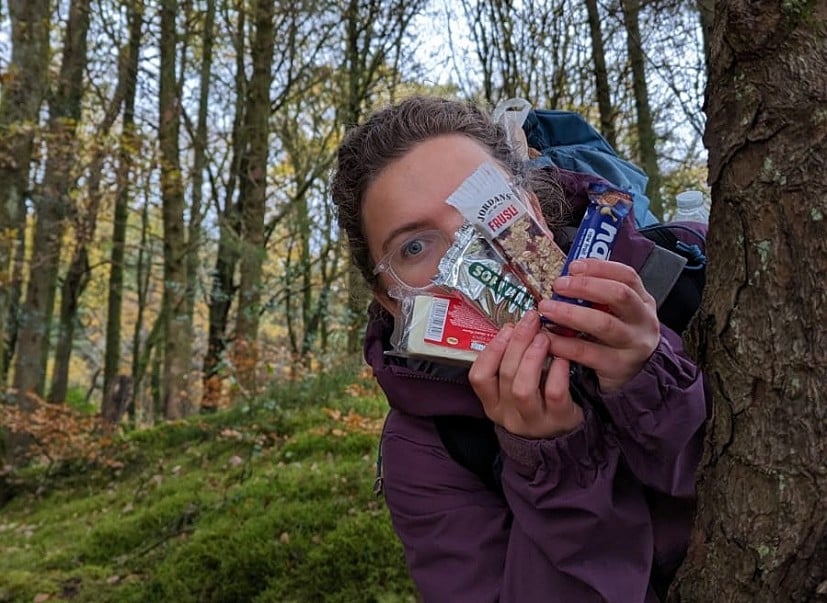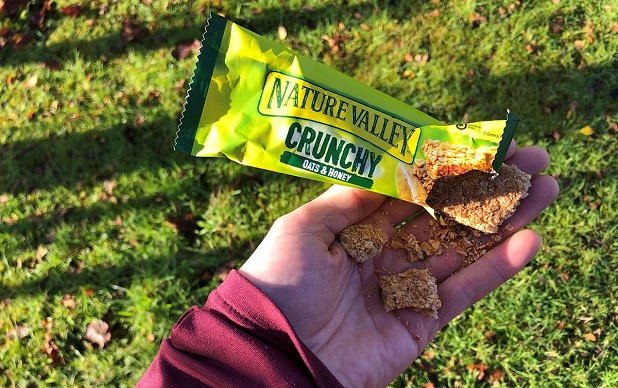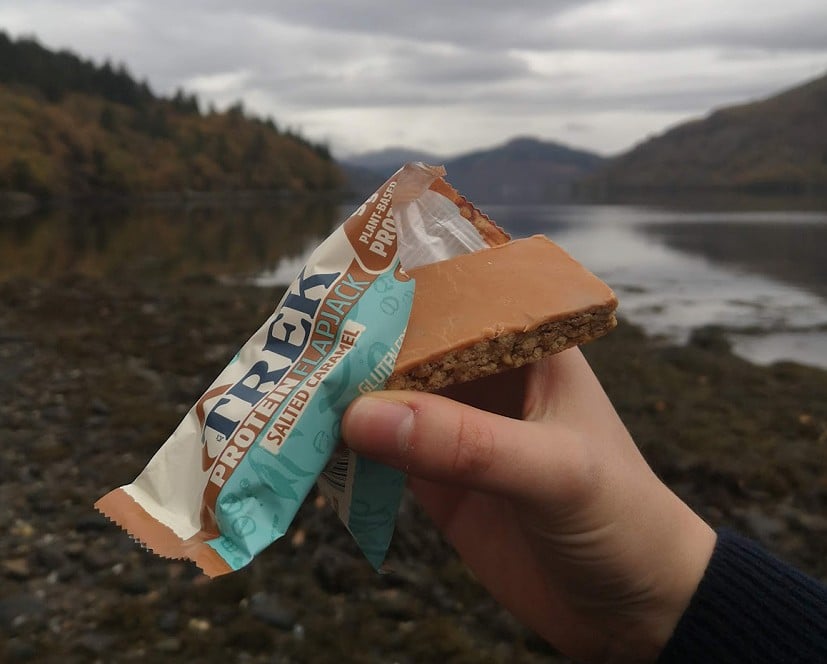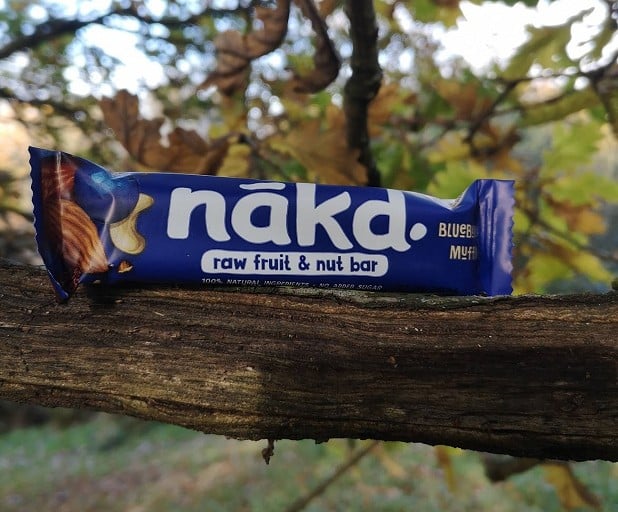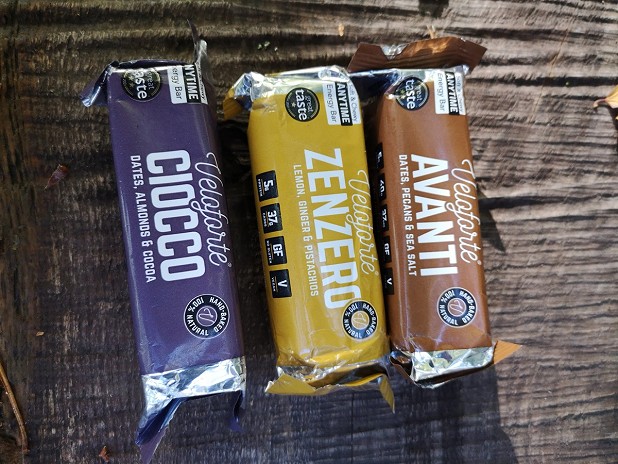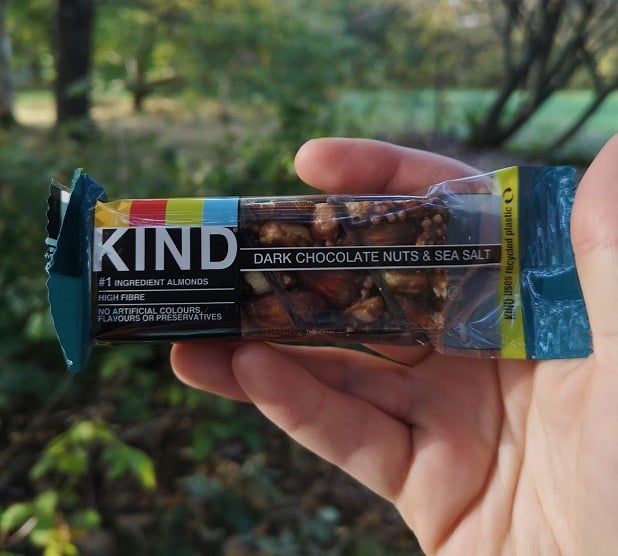Cereal Bars, Ranked
Walker, runner or climber; pretty much everyone snacks on bars. They are a convenient way of getting both fast and slow release energy: you don't have to think about them, they should be easy to eat without stopping, and you can throw them into a pack and forget they're there till you need them. But not all bars are created equal. Some have the taste and nutritional value of compressed sawdust, while others are almost pleasant.
Because I am both a champion of consumer affairs, and probably unemployable elsewhere, I have tested 12 common species of cereal bar to determine which is best adapted to being hill-food.
they're mostly made of air, with a few oats as decoration...
As with some of my other food review articles, there is some built-in subjectivity - not helped by my suspicion of Nestle, Kelloggs, and snacking culture in general - but I have tried to organise things logically.
The bars are categorised into separate genera depending on constitution, and ranked on overall calories per gram per cm³ (no point taking mostly packaged air), and nutritional balance for a hill-day: unlike toddlers and cyclists, we're not after things which are all sugar here, so a good mix of complex carbs, fibre, fat and a little protein is important too. I've also considered freezability for winter walking and mountaineering, deliciousness, and cost. All these factors are combined to give each bar a score out of 50.
Welcome, my friends, to The (B)article [as with flavour, we set a low bar for puns - Ed]...
Section one: Lunchboxy cereal bars
These sorts of cereal bars can be found anywhere, even down to the most-poorly stocked petrol stations for emergency supplies when you discover you've left your lunch at home. Often boasting about how few calories they contain, they're unlikely to win this competition, but some of them will do in a pinch. The advantage here is that they're cheap, light, and easy to eat.
Benefit bars (Aldi's knock-off Special K bars, Jaffa Flavour)
These have forty three ingredients. Forty three. Strikingly, the first one - before any sort of grain - is fructo-oggliosaccherides. That's an industrial sweetener which is sold as having negligible effects on blood glucose, but really, I don't want it anywhere near my blood. Or anything else quite frankly. These are the definition of a waste of time: coming in at just 66 calories per bar, you might as well eat plain rice-cakes while sniffing a terry's chocolate orange instead.
- Deliciousness: 5/10 Annoyingly, they're alright, if in a slightly artificial, I-can-taste-the-citric-acid-crystals way. Texture-wise, it's like eating crunchy, dusty air.
- Nutrition: 2/10 A seemingly good balance of carbs to fibre, to sugars, until you remember that all of this is courtesy of a smorgasbord of bizarre additives, and each bar contains only enough calories for a mouse on a hangover.
- Calories per gram per cm³: 3/10 At 348 calories per 100g, this is the bottom of the range, so you'd have to eat more than a whole box of five bars to get that number inside you.
- Freezability: 5/10 Not hugely unpleasant, just slightly more brittle.
- Cost: 7/10 They're 90p per 100g, making them one of the cheaper options here.
- Overall score: 22/50
Jordans Frusli bars
The reason these aren't in the oat category is that they're mostly made of air, with a few oats as decoration. At 17 ingredients, they're definitely a better bet than the Benefit bars if you're looking for something less processed, but don't expect much in terms of satiation or nutrient density - pair with some nuts if you're going for these. Or just go with the nuts.
- Deliciousness: 4/10 Really not great. Overly sweet, and gums your teeth together. The berries are nice. Wish there were more of them.
- Nutrition: 3/10 If you're looking for something carby, then sure, but each 30g bar contains nearly 9g of sugar against a measly 1.1g of fibre.
- Calories per gram per cm³: 4/10 100g has 398 calories. You'd have to eat 3 + ⅓ bars to get that, which seems a bit sad.
- Freezability: 4/10 Shattery but edible.
- Cost: 2/10 They RRP at £1.28 per 100g, and are sold in 200g boxes. £2.30 can be better spent elsewhere.
- Overall score: 17/50
Nutri Grain bars
Look, I know we're not exactly off to a flying start, but let me really inject some lead in our balloon now. These things are vile. Claggy, with a fruit-flavoured goo in the centre (it says apple on the packet, but the relationship with its fresh counterpart is negligible). Their only redeeming feature is that they're easy to eat when frozen, and can get down the gullet quickly in emergencies.
- Deliciousness: 2/10 No, no, no. The coating is dry and has a strange gravelly texture, and the less said about the middle, the better. None of it tastes like real food, probably because it isn't.
- Nutrition: 3/10 These have all the health claims on the planet: wholegrains, fibre fortified with vits and mins, a source of B12. But at 12g of sugar per bar (a third of the bar), little fibre, and lots of the fat coming from palm oil, these left me hungrier than before I had one.
- Calories per gram per cm³: 4.5/10 100g (50g of which will be pure sugar) has 367 calories, so it's slightly disappointing on this front, but these bars are denser than others, so take up less room in the pack.
- Freezability: 8/10 These are absolutely fine in the cold, and if you're not fussed about taste and need an instant glucose hit, rather than anything long-lasting, they'd be an ok option for winter hillwalking.
- Cost: 3/10 They RRP at £1.28 per 100g, but there are six 37g bars to a box. £2.30 can be better spent elsewhere.
- Overall score: 20.5/50
Section two: Oat-based offerings
Striking the balance of affordability, calorie density and nutritional balance, oat-based offerings have long been a good option for hill days. Many, however, rely solely on carbohydrates with surprisingly little fibre for slowed-down release of energy over time, and some taste like if wallpaper paste and oats had a fight, and wallpaper paste won. Here are the options I tried.
Stoats/Lidl Oat Raspberry and Honey/Apple and Cinnamon Bars
These are a go-to bar for most of the people I talked to about this article, and I can see why. Weighing in at 50g each but still small enough to fit in the palm of your hand, they're the only ones I've tried so far which actually fill you up. They're sweet, yes, but I'm pleased to see that it's real sugar and golden syrup which stick these bars together, as well as actual butter, from a cow, rather than palm oil from a rainforest.
- Deliciousness: 7/10 Tastes like you might be able to make it at home. The raspberry one just tips it for me, but both flavours are well-balanced and taste like what they say they do. Texture-wise, I'm not mad about its slight graininess but you can't have everything.
- Nutrition: 8/10 These bars are actually pretty well balanced with both fast and quick release carbs, plus enough fibre, fat and some amount of protein to balance everything out over time. Chicory root fibre (inulin) is about the only thing you wouldn't find in a household kitchen here.
- Calories per gram per cm³: 9/10 These pack in 430 calories per 100g, and the satiating fat, protein and fibre here means that for me, two bars is more than ample fuel for a morning of walking.
- Freezability: 6/10 Due to the fat content, these retain a slight softness when very cold, but overall, they're worth storing in a pocket for both body heat and easy access in winter.
- Cost per 100g: 5/10 The branded bars are expensive at around £2.30 for four (£1.15/100g), but Aldi and Lidl knock-offs cost slightly less, at between £1.49-£1.99 for four (£0.75-£0.99/100g). They're pricey but that's because they're made with more expensive butter and sugar over glucose syrup and palm oil.
- Overall score: 35/50
Clif bars (flavour tested: white chocolate and macadamia nut)
Clif bars are a ubiquitous offering at most outdoor shops and are popular around the world with athletes. They're oat-based, for sure, but definitely more of a fortified protein-bar option than a flapjack in itself, given the amount of soy products involved.
- Deliciousness: 7/10 I quite like these. They've got a cookie-ish sort of texture and are sweet enough without being overpowering. Although this time I've got the white chocolate macadamia one, the chocolate hazelnut filled ones are nice too.
- Hill Nutrition: 8/10 Clif bars are prototypical of most outdoor-marketed hill-snacks. They're around 60% carbs, of which half is fast-release sucrose, and they have enough fibre and protein for longer-term satiation too. The ingredient list is a little questionable (three types of sugar) but that's also due to the listing of various minerals with which they're fortified.
- Calories per gram per cm³ 6/10 Clif bars have 411 calories per 100g and their 68g bar size means that you get a feeling of fullness after eating them, even if it's just from volume alone to start. They're not that dense, though, so if you're looking to save space, these might take up more room than you want for the calories.
- Freezability: 6/10 These go a little harder in the freezer, but because they're quite soft already, they will be fine in winter.
- Cost: 2/10 Spendy. Obviously. At £1.85 per bar RRP, we're talking £2.72/100g, which is silly money. Buying in bulk online is the way to go for these.
- Overall score: 29/10
Generic Home Bargains flapjack
As perhaps the cheapest option other than a banana, these are bargain bang for your buck. Just 39 of your hard-earned pence will buy you a 120g slab of hillwalking energy. That's far, far cheaper than you could make it for at home if you include oven costs and labour. Are they tasty? Sort of. Do they do the job? Yes, absolutely, and then some.
- Deliciousness: 6/10 It loses points for being made with margarine (palm oil, veg oil) but luckily there's a natural caramel flavour from the molasses and golden syrup to disguise that taste. The plain ones are 2338% nicer than the cherry bakewell ones, by the way.
- Hill Nutrition: 7/10 These are slightly more sugary per 100g than most of the Stoats-style options but still give a good wallop of fat for energy with a nice bit of roughage, and a little protein too.
- Calories per gram per cm³ 9/10 They come in large 120g bars so offer 511 calories a throw (426/100g) - I find I can't eat a whole one in one, so take bites occasionally instead over a few hours. They would make brilliant emergency rations.
- Freezability: 4/10 Due to their large size, these become rather cumbersome to eat when frozen, and seem not to have that same suppleness that the Stoats do. Best kept on your person in winter rather than in your bag. If you're OK with pocketing a paving slab.
- Cost: 10/10 At 39p each (32.2p/100g) I have no idea who is making any profit here. You can buy packs of these online in bulk, if you're wondering.
- Overall score: 35/50
Nature Valley bars
You know the drill with these: they sit at the bottom of your bag for hours and crumble everywhere as soon as you open them - but they're ok as hill-food as long as you're still having a good time. The moment you're struggling however, they turn to cement in your mouth.
- Deliciousness: 7/10 Crunchy and sweet, with a nice rounded flavour. Two is enough for a portion; any more and you'd start to feel sorry for your teeth.
- Hill Nutrition: 6.5/10 At just under ⅔ total carbohydrate, with around a teaspoon of sugar per individual bar these are a good bet for both quick and sustained energy. They don't contain much you wouldn't find in a household kitchen, which is definitely a good thing.
- Calories per gram per cm³ 8/10 Per 100g, these have an impressive 467 calories, and don't take up much room. This is partially because they are more biscuit-like in comparison to other bars, but that does make them less edible if you're low on water.
- Freezability: 4/10 These are pretty annoying to eat when frozen.
- Cost 3/10 They fall down here, as the branded ones are £2.50 for six, coming out at £1.19 per 100g.
- Overall score: 28.5/50
Trek protein flapjack
Trek does some squished fruit and nut bars too, which I review in a few paragraph's time, but I wanted to test their range of protein flapjacks to see if they were worth the price. I chose the salted caramel ones, at great expense, and had a particularly underwhelming experience.
- Deliciousness: 4/10 Far, far too sweet and artificial tasting to be enjoyable for long. Salted caramel topping is kind of meh, but goes gooey in your pocket.
- Hill Nutrition: 7.5/10 Soya crispies provide much of the protein here, and at 9g per bar, it's not a bad offering, but you're definitely paying more for it than if you took a few slices of salami with you instead. As a unit of nutrition, though, Trek protein flapjacks are fine: around 50% carbs (half of which are sugar) 20% protein, and the rest fat and fibre. However, the long, complex ingredient list is off-putting.
- Calories per gram per cm³ 8/10 per 100g, these contain 446 calories, which is admirable. Each bar is 50g and has a surprising lightness to it which, happily, doesn't impede too much space taken up.
- Freezability: 7/10 These freeze quite well.
- Cost 2/10 A real spendy one, this. At around £3 for three bars (£1.62/100g), you can get 7.69 of those bargain flapjacks out of Home Bargains for the same money.
- Overall score 28.5/50
Section three: Squished fruit and nuts/nut bars
Full disclaimer: I generally dislike this sort of thing. However, raw fruit and nut bars can often be a good option for quick calorie insertion, as their reliance on dates as a sweetener means an almost instant glucose hit, with a few micronutrients thrown in there for good luck.
Nakd bars (flavour tested: blueberry muffin)
Nakd bars, to me, are the epitome of all fur coat and no knickers, but they're a go-to for the vegan/gluten free community so they're getting tested. Worth noting that Lidl's knock-off version is similarly vile but cheaper.
- Deliciousness 4/10 I think they taste like blueberry flavoured plasticine but some people go mad for them, so they're getting a generous score here.
- Hill Nutrition: 6/10 A short ingredient list is a plus, but you don't want to be relying on these for long, slow release energy, as over half of the calories by weight come directly from sugar. Oh, sure, it's natural sugar, and comes with a gram or so of fibre per bar, but don't bother trying to explain that to your blood glucose. This is instant energy, and that's fine if that's what you're looking for.
- Calories per gram per cm³ 6/10 At 371 calories per 100g, this isn't mind-bogglingly energy dense because these are some of the lower fat options on the market. With that in mind, however, I can see these might be useful for running as they're very easy to digest and are small enough to fit several into a running vest.
- Freezability: 3/10 They turn solid due to a higher moisture content. Avoid when cold if you value your tooth enamel.
- Cost: 3/10 The real thing is expensive; in fact, one the most expensive bars here. They RRP at £3 for three 35g bars, giving a per 100g score of £2.14. I don't need to tell you what to think about that.
- Overall score: 23/50
Trek bars (flavour tested: peanut power)
Trek are a market leader in the rugged snacking bar market, hence the appearance of two of their products here. So how does the second one stack up?
- Deliciousness: 3/10 I don't like them at all. There's a weird bitterness at the back of the mouth, and the texture is like chewable grout. This is not something to savour on a summit.
- Hill Nutrition: 6.5/10 Again, much of the carbohydrate here is sugar, which is fine if you're looking for a quick hit. In comparison to Nakd bars, however, Trek offers almost triple the amount of protein (from the addition of soya crunchies), which means they might keep you fuller for longer. I'd be interested to see someone's continuous glucose monitor for this one.
- Calories per gram per cm³ 7/10 At 374 calories per 100g, these aren't mindblowingly dense, but luckily they come in hefty 55g bars, so you do feel a little satiated afterwards, even if it's mingled with disappointment.
- Freezability: 4/10 These also go very hard when frozen, so keep them close to your body if you have to.
- Cost: 3/10 Again, expensive: £1.82/100g, or around £3 for 3.
- Score: 23.5/50
Velforte bars
I don't think many people are aware of Veloforte bars, so let me sum them up: they're beautifully tasty bars which come with a price-tag which makes you want to throw them back up again.
- Deliciousness: 9/10 I couldn't quite believe how nice these were, especially the date, pecan and salt flavoured bar. Chewy, perfectly balanced spices, sweet - it's all there. They've even won a great taste award, which says a lot.
- Hill Nutrition: 6/10 Deliciousness aside, these are really designed for cyclists who need a shedload of carbs ASAP. Each 62g bar delivers 40g of carbs, of which 30 are sugar, plus 8g of fat, followed by 5g each of protein and fibre. It'd score higher for hillwalkers if there was a more even split of both types of carbs.
- Calories per gram per cm³ 7/10 At 407 calories per 100g, these are getting towards the top of the range. Each bar feels like a meal in itself because it does require some amount of mastication. I don't actually imagine they're that easy to eat on a bike, but they're certainly small, dense and packable for a hillwalking trip.
- Freezability: 2/10 Not ideal for winter. You could use it as a hammer if you fancied putting up some pictures though.
- Cost: 0/10
"Eight pounds and twenty five of your pences, then, for a multipack please, sir".
"Oh, how many bars do you get for that? In the multipack?"
"Three, sir."
"Ah."
- Overall score: 24/50
Kind bars (flavour tested: dark chocolate, nuts and sea salt)
If I had to pick one bar to eat over and over again, it'd be this one. Kind bars are essentially nut brittle covered in chocolate, but you know that they're going to keep you sustained and happy too. And they have chocolate. Thank goodness.
- Deliciousness: 9/10 I am currently eating one while writing this. They're chewy, salty, sweet and crunchy all at the same time. I reckon they'd do well as petit fours if they were chopped up smaller.
- Hill Nutrition: 7/10 It's always a surprise to me how balanced these are. They have more fat than carbohydrate - and are the only bar in this review to do so - so you're getting very slowed release energy from that, as well as a quarter from mixed carbs. There's also a whopping 13 grams of fibre (double most of the others) and 17g of protein per 100g, so if you struggle with your blood sugars but still want something sweet to keep you going (with around a teaspoon of sugar per bar), these are a really good bet. They do contain some industrial ingredients, however.
- Calories per gram per cm³ 8/10 These are the most calorific of the lot due to the fat content from the nuts. 100g contains 511 calories, and is densely packed into something that is easy to eat, doesn't fall apart in your bag.
- Freezability: 4/10 These go very brittle but are still edible down to a point, but overall they're not great in the cold.
- Cost: 1/10 Damn my expensive taste. These come in small bars too, and cost a fortune, between £2-3 per pack which works out at £3.33/100g at full price. I'll only buy when on offer. And no, before you ask, the Lidl Deluxe nut bars just don't cut it for me, but do try them if you fancy.
- Overall score: 29/50
The results
So here it is, in descending order of preference - our pick of the bars:
Interestingly, if this was done only on taste and nutrition, there would be vastly differing results. But price and calorie density is always a consideration, so leading the pack we have the oat-based bars, with Stoats and the Home Bargains flapjacks coming in at 1st place. Because I'm judging this competition, and should probably pick an overall winner, I'd pick Stoats over the HB flapjacks because they're half the size and easier to eat in one go - despite the stonkingly good value of the HB ones.
Honestly? I prefer the sort of bar you'd end up diving into after a day on the hills, rather than during. My preference for hill-food is always to vary the snacks and have lots of other options too (pork pies, scotch eggs, fruitcake) but of course, bars do have their place. Even if for some of them it's nowhere near a mountain.



